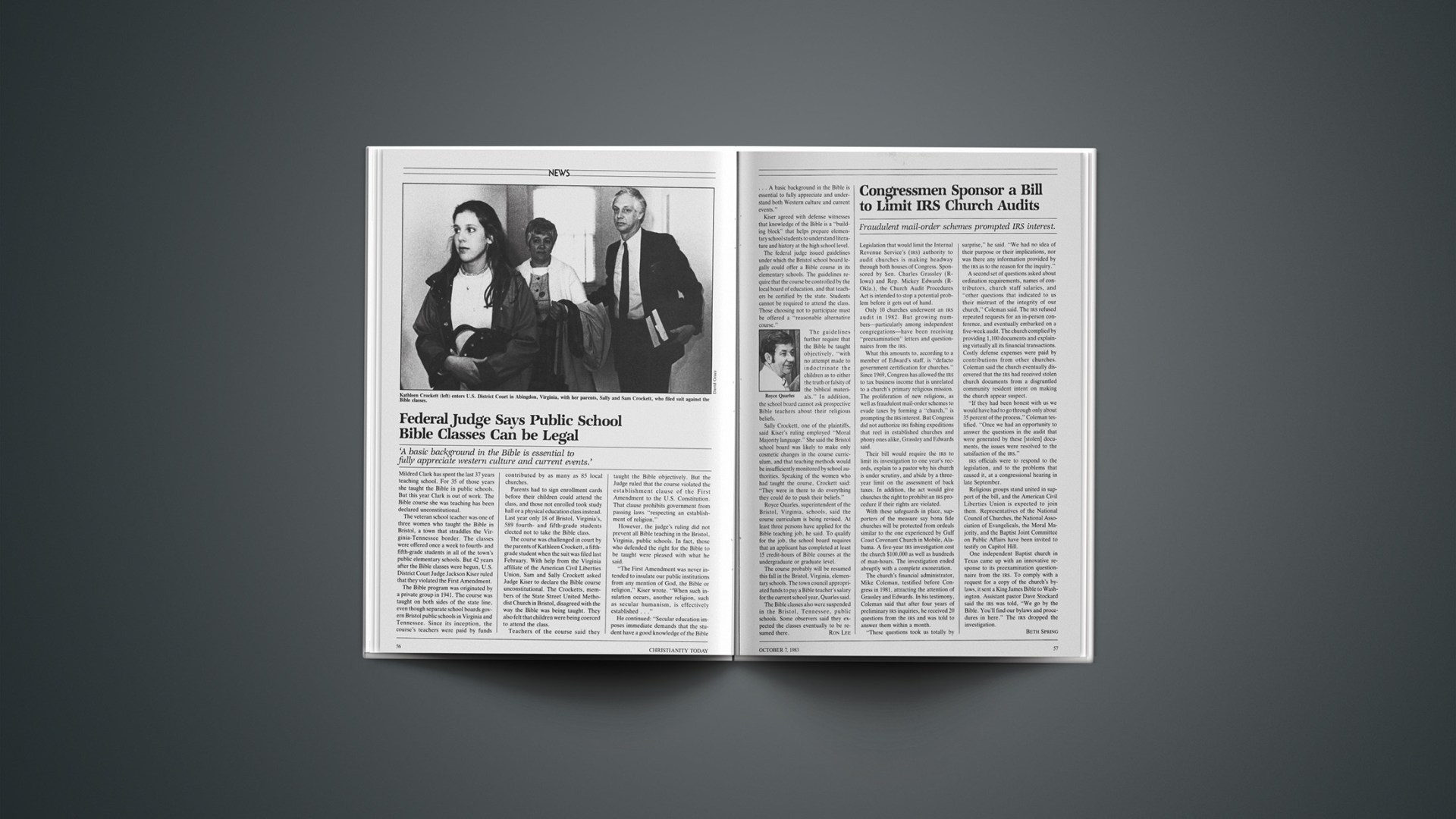Fraudulent mail-order schemes prompted IRS interest.
Legislation that would limit the Internal Revenue Service’s (IRS) authority to audit churches is making headway through both houses of Congress. Sponsored by Sen. Charles Grassley (R-Iowa) and Rep. Mickey Edwards (R-Okla.), the Church Audit Procedures Act is intended to stop a potential problem before it gets out of hand.
Only 10 churches underwent an IRS audit in 1982. But growing numbers—particularly among independent congregations—have been receiving “preexamination” letters and questionnaires from the IRS.
What this amounts to, according to a member of Edward’s staff, is “defacto government certification for churches.” Since 1969, Congress has allowed the IRS to tax business income that is unrelated to a church’s primary religious mission. The proliferation of new religions, as well as fraudulent mail-order schemes to evade taxes by forming a “church,” is prompting the IRS interest. But Congress did not authorize IRS fishing expeditions that reel in established churches and phony ones alike, Grassley and Edwards said.
Their bill would require the IRS to limit its investigation to one year’s records, explain to a pastor why his church is under scrutiny, and abide by a three-year limit on the assessment of back taxes. In addition, the act would give churches the right to prohibit an IRS procedure if their rights are violated.
With these safeguards in place, supporters of the measure say bona fide churches will be protected from ordeals similar to the one experienced by Gulf Coast Covenant Church in Mobile, Alabama. A five-year IRS investigation cost the church $100,000 as well as hundreds of man-hours. The investigation ended abruptly with a complete exoneration.
The church’s financial administrator, Mike Coleman, testified before Congress in 1981, attracting the attention of Grassley and Edwards. In his testimony, Coleman said that after four years of preliminary IRS inquiries, he received 20 questions from the IRS and was told to answer them within a month.
“These questions took us totally by surprise,” he said. “We had no idea of their purpose or their implications, nor was there any information provided by the IRS as to the reason for the inquiry.”
A second set of questions asked about ordination requirements, names of contributors, church staff salaries, and “other questions that indicated to us their mistrust of the integrity of our church,” Coleman said. The IRS refused repeated requests for an in-person conference, and eventually embarked on a five-week audit. The church complied by providing 1,100 documents and explaining virtually all its financial transactions. Costly defense expenses were paid by contributions from other churches. Coleman said the church eventually discovered that the IRS had received stolen church documents from a disgruntled community resident intent on making the church appear suspect.
“If they had been honest with us we would have had to go through only about 35 percent of the process,” Coleman testified. “Once we had an opportunity to answer the questions in the audit that were generated by these [stolen] documents, the issues were resolved to the satsifaction of the IRS.”
IRS officials were to respond to the legislation, and to the problems that caused it, at a congressional hearing in late September.
Religious groups stand united in support of the bill, and the American Civil Liberties Union is expected to join them. Representatives of the National Council of Churches, the National Association of Evangelicals, the Moral Majority, and the Baptist Joint Committee on Public Affairs have been invited to testify on Capitol Hill.
One independent Baptist church in Texas came up with an innovative response to its preexamination questionnaire from the IRS. To comply with a request for a copy of the church’s bylaws, it sent a King James Bible to Washington. Assistant pastor Dave Stockard said the IRS was told, “We go by the Bible. You’ll find our bylaws and procedures in here.” The IRS dropped the investigation.










